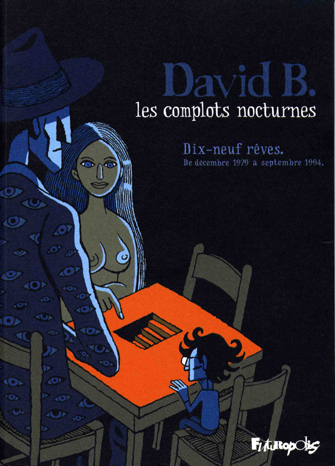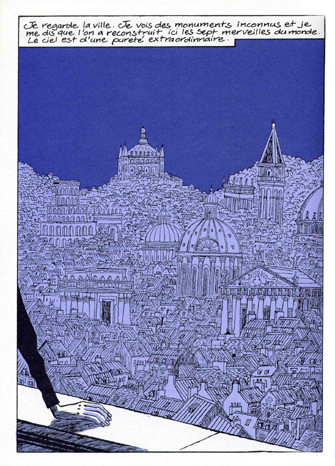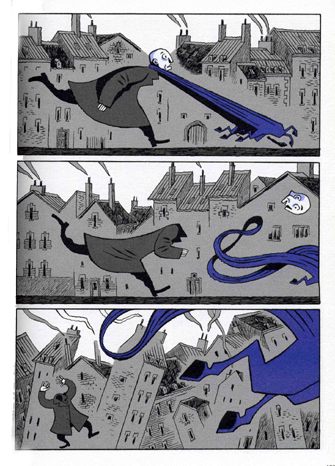 Home > Bart Beaty's Conversational Euro-Comics
Home > Bart Beaty's Conversational Euro-Comics Les Complots Nocturnes, David B.
posted August 3, 2006
Les Complots Nocturnes, David B.
posted August 3, 2006


Reading Matthias Wivel's
excellent interview with
Jean-Christophe Menu in the new issue of
The Comics Journal and the Menu-edited
Eprouvette #2 in rapid succession, has me once again thinking about the notion of independence in the contemporary comics scene. This is a subject that I write about at length
in my forthcoming book, but even though it hasn't been released yet a series of changing developments already makes me feel as if my comments may be out of date by the time they're published in December. The terrain is constantly shifting.
Of course, no artist's position has shifted as much in the past couple of years as has that of
David B. Having now left L'Association (a fact discussed
in his own Comics Journal interview as well as that of Menu), the publishing house that he co-founded in 1990, David B. has recently published
Les Complots nocturnes with the new Gallimad-Soleil-owned Futuropolis. There is no doubt that David B. is the
bijoux in the Futuropolis crown, the best and the brightest of their acquisitions to date (which also include stars like Blutch, Philippe Dupuy, Nicolas de Crecy and Ludovic Debeurme). It is David B., riding the wave of critical and commercial success from
Epileptic and the newly created
Babel, whose presence legitimizes the newly revived publishing house.
Complots nocturnes is, in a way, a rebirth for David B. His first important book for L'Association, a decade and a half ago, was
Le Cheval bleme, a collection of short comics based on his dreams.
Les Complots nocturnes is a return to this territory. Subtitled:
Nineteen Dreams, from December 1979 to September 1994, the book illustrates the author's interior psychic spaces. This is a beautifully realized book, although, like
Cheval bleme, a minor one. Perhaps this is merely a personal bias, but I hate dream comics. I find that there is almost nothing more boring than hearing about other people's dreams, and reading about them can be a chore. There are very few artists whose dream book I would buy, and David B. makes that cut.
The success of
Les Complots nocturnes reside in the artist's rendering and page design. David B. has gradually and subtly altered his style over the past decade and a half, making for a richer visual texture. While his line has always been somewhat shaky, this tendency is today more pronounced than ever, particularly given his new emphasis on hatching instead of solid blacks. His lines now are noticeably shorter than in the past, and his page layouts more varied. Throughout
Les Complots nocturnes he strategically deploys full-page splashes for emphasis (a technique used only once in
Cheval bleme), as well as a constantly shifting mix of vertical and horizontal page-width panels that de-emphasize his prior reliance on the four panel square.

The other major difference between the new book and the one from 1992 is the presence of two-color printing. I'm not sure when or how two-color printing became the hallmark of aesthetic seriousness in the independent comics milieu, but there is no doubt that it currently functions in that manner. David B.'s use of a muted blue throughout
Complots nocturnes is a lovely counter-point to his previous black-and-white work. It provides the book with a richer, fuller feeling that is perfectly appropriate to the dreamy material.
It seems apropos that David B., who made his initial mark on the small-press scene with a dream comic, would return to that ground now that he has broken with that past. The creation of L'Association marked a break with the established publishing houses of the day, and, ironically, David B.'s departure has brought his former home into such a conflict once again. The first two issues of
Eprouvette reveal the correspondence between L'Asso and Casterman about the rights to print a collected edition of the artist's Incidents de la nuit, three volumes of which have been published by L'Asso.
In short, David B. would like to take these books from L'Asso to Casterman, who would publish a new collected edition. In the United States, this is becoming increasingly common practice (think of Pantheon cherry-picking the rights to
Jimmy Corrigan,
Black Hole,
La Perdida, etc.). In this case, however, L'Asso is fighting Casterman, with threats of lawsuits. They argue that they have a valid and enforceable contract to keep this books in print, Casterman argues that they don't. I don't have an opinion on this issue, as I am not a lawyer, and I have not read the contracts, so I have no idea who is right and who is wrong. But it is interesting to see the emergence of this kind of fight now between L'Association and the long-established Casterman. It signals the fact that things are quickly changing in the French comics market.

One final note: Recently, on the
ActuaBD site,
Didier Pasamonik took issue with L'Association in this dispute, coming down squarely on the side of Casterman. Perhaps M. Pasamonik knows the details more fully than I, although little in his essay gives that sense. While I have no interest in inserting myself in the midst of an ongoing legal controversy over the issue of contractual legitimacy, I found the accusation leveled at L'Association that they are behaving as Dargaud did
vis a vis Uderzo and Goscinny to be particularly misleading and unfair. Uderzo and Goscinny brought suit against Dargaud because the publisher had defrauded them through self-dealing on translation rights. There is nothing resembling this charge in the current situation, and to suggest a moral equivalence between the cases is repugnant. I realize that many of the writers at
ActuaBD have a grievance against Menu and Trondheim and a specific axe to grind, but this kind of baseless accusation does nothing to raise the level of critical discourse about comics.
*****
To learn more about Dr. Bart Beaty, or to contact him,
try here.
Those interested in buying comics talked about in Bart Beaty's articles might try
here or
here.


